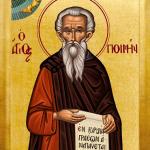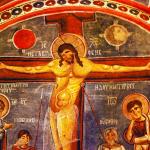
St. Jerome, interpreting the way Jesus was predicted to have the government upon his shoulders (cf. Isa. 9:6), suggested that this could be seen as being about the cross:
And although he showed that he was God from the fact that he had been said “Emmanuel” above [cf. Isa 7:14; 8:8], that is, God with us, nevertheless now he says that his government has come upon his shoulder. This means either that he himself carried his own cross [cf. John 19:17], or, he is showing by shoulder the strength of his arm. [1]
Jesus reigns by the cross. His kingdom, his authority, indeed, the law which he established, is all connected with and bound to the cross. Everything he does is connected to the cross. He is the lamb of God slain from the foundation of the world (cf. Rev. 13:8), which is why, though the passion happened at a particular time and place, the sacrifice of the cross, the sacrifice of love, is eternal and capable of bringing the whole world together as one. The cross leads us to experience the eternity of God’s love, the kingdom of God. We are called to the kingdom of God, we are entreated to enter into it and to experience the eternity of God’s love; to do so, we must embrace the cross, the government of that kingdom, which is why Jesus said if we want to be with him, if we want to reign with him, we must take the cross upon ourselves and follow after him:
And he called to him the multitude with his disciples, and said to them, “If any man would come after me, let him deny himself and take up his cross and follow me. For whoever would save his life will lose it; and whoever loses his life for my sake and the gospel’s will save it. For what does it profit a man, to gain the whole world and forfeit his life? For what can a man give in return for his life? For whoever is ashamed of me and of my words in this adulterous and sinful generation, of him will the Son of man also be ashamed, when he comes in the glory of his Father with the holy angels” (Mk. 8:34-38 RSV).
The reign of God, the reign of Christ, is one with the cross; if we want to experience the glory of the kingdom of God, the glory of God’s love, we must embrace the cross for ourselves. We must follow after Jesus and die to the self. Then, like Jesus, we will be able to embrace the radical nature of love. The cross would have us cut off all that is unlove, all that is sin, from ourselves. Then, freed from sin, we can then truly live our lives embraced by the power and glory of love.
Jesus reveals to us the truth of God, the truth of love; love does not hold onto the self and seek after its gain against the good of others; rather, love would have us give of ourselves to our beloved. Love would have us lift them up so that they can experience all that is good for themselves. For it is in and through such self-giving that love becomes strong, stronger than death itself. Death has no sting when love reigns supreme. And so through the cross, the love of God is revealed. Knowing this, we should better understand Jesus when he said, “Truly, I say to you, there are some standing here who will not taste death before they see that the kingdom of God has come with power” (Mk. 9:1b RSV). For many of those with him did see the kingdom of God come with its power, for they saw Jesus on the cross. They saw the victory of Christ, the victory of love, though at the time they did not know it. Indeed, at the time when Christ held the government upon his shoulders, they thought he had lost everything, and because he did, that they did as well.
On the cross, Jesus showed us the truth of the kingdom of God, the truth of its power, which is the truth and power of love. On the cross, his arms were stretched out so as to take upon his shoulders the burden of the whole cosmos. It was a great burden, one which took him all the way to death and hell itself, but it was one he willing to take on because of his love. It is a love which would not be extinguished, no matter how much Jesus was burdened by the cross. The powers of sin could not destroy him, nor could they destroy that which he placed upon his shoulders through his embrace of the cross, that is, the whole of creation; Jesus rose in victory, taking everything with him, showing that everything has its place in the reign of God.
If we are to experience eternal life, if we are to have the abundant life of the kingdom of God, the abundant life of love, we must follow after Jesus. We must allow the kingdom of God be placed upon our shoulders. We, like Jesus, should embrace the fullness of love, the fullness of the cross and its radical call for self-detachment. We can venerate the cross externally, kissing its image in front of others, but we should do more than that, we should embrace it for ourselves, and truly take it up and venerate internally, letting it transform us by embracing the government of God, the government of love, for ourselves.
The cross connects heaven and earth. It shows us the sacrifice of divine love for the sake of creation. God’s self-sacrifice calls us to love, to share in the sacrifice of love, to give ourselves over to God with love. We must cast aside all that is unlove through the power of the cross. When we do so, we can find ourselves one with God through love. Truly, this is why we must embrace the cross, but in doing so, we should not be surprised that the love represented in the cross is not always easy to attain. We have so much unlove in us to overcome, and in doing so, the cross and what it expects of us might seem like a great burden. But the more we cast aside our selfishness, the more we embrace love in its most radical form, the more we will come to experience the glory of love and the joy which it brings, until at last, we find ourselves so full of love, we find ourselves sharing in and participating in the divine life itself. Then we will know and understand why Scripture says God is love, not through theoretical knowledge, but by experience. We must become, as it were, like moths to a flame, giving ourselves to the flame of love, and only then will the full power of the cross, the full power of love, be revealed to us, as we find ourselves brought to new life in and through that love. This is what it means to embrace the cross and to become co-heirs with Christ and reign with him in the kingdom of God: it is to reign with love, the love which is manifest and revealed in Christ on the cross.
[1] St. Jerome, Commentary on Isaiah in St Jerome: Commentary on Isaiah; Origen Homilies 1-9 on Isaiah. Trans. Thomas P. Scheck (New York: Paulist Press, 2015), 191.
Stay in touch! Like A Little Bit of Nothing on Facebook.
If you liked what you read, please consider sharing it with your friends and family!
















